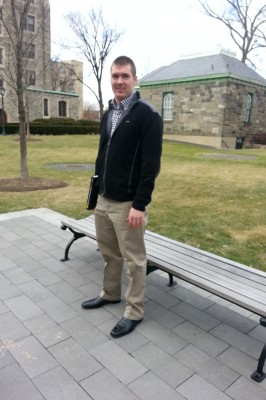Brett Biestek is Hitting Back at Stigmatization of the Student Athlete
January 30, 2014
Playing for one of the most successful football teams in Fordham’s history is impressive. But Brett Biestek, Graduate School of Business (GSB) has also accomplished academic achievements. He was recently named to the Football Championship Subdivision Athletics Directors Association (FCS ADA) Academic All-Star team, proving that academics and athletic excellence aren’t mutually exclusive.

The defensive lineman was just one of three players based in the northeast to be honored by the National Academic All-Star team. Each qualified FCS player is nominated to the team by their coaches. The nominee must have a required minimum GPA of 3.20 in undergraduate study in order to be considered. Biestek, who was majoring in finance, finished his undergraduate career in 3.5 years. He has a cumulative 3.78 GPA.
Biestek is also one of seven finalists for the FCS ADA’s $5,000 Postgraduate Scholarships, which will be determined in June. He could hardly believe it. “I was really amazed, I knew I had done well in school, but I didn’t realize the level I had performed,” he said.
Biestak started in all 14 of the Rams’ games this season. He was a part of the miraculous 10-0 start to the season and saw the team end the year at 12-2. The Rams finished the year ranked 9th place in the National Collegiate Athletic Association (NCAA) FCS Sports Network poll. Individually, Biestek had a terrific season. He ended the season with 58 tackles, 14.5 tackles for loss, three fumble recoveries and five sacks.
Many members of Biestek’s family played football. His father and two uncles all played college football. One uncle went on to play professionally, and Biestek’s grandfather played semiprofessionally. His brother is now a freshman at Brown University and he too will be continuing the family tradition. Although he comes from a football family, his parents taught him the value of hard work and education.
His father is a doctor and his mother is a nurse, so he understands the work it takes to be successful academically. “It really does come down to working hard. If you go to class, if you do your homework, if you study, you’re able to do well in class,” he said. “And I think I was able to do that.” He admitted he was also lucky because his parents are both smart, so he must’ve inherited some of their intelligence as well.
Biestek also found that both academics and athletics are equally difficult but just in different ways. “Football is mentally stimulating because there is a tremendous, 300-plus playbook that we have to know every page of. It also has that aspect of physical wear-and-tear every day, for months on end,” Biestek said. Of the two, he considers academics to be more mentally stimulating. And although they’re both challenging, the effort is worth it. “You can’t be successful in either one unless you work hard,” he said.
Studying and playing football go hand in hand, according to Biestek, who argued that each one has a positive effect on the other. He even felt that he did better in school during the football season as opposed to the offseason. Why? Biestek said, “My time was so much more constricted. I was almost forced to buckle down and get my work done so I’d be able to go to practice and go to games.”
He believes that the balance of academics and athletics makes a well-rounded person. And that’s why he came to Fordham. “I wanted to go to the best academic school I could, at the highest level of football,” Biestek said. “I also wanted to be in business and I saw that Fordham had a great business school. I thought it would be a great fit for me.”
The toughest part about being a student athlete may actually be the stigma attached to it. He said, “At the beginning of college, I tried not to tell teachers that I was an athlete because I didn’t want to seen as ‘oh, he’s on the football team so he’s not that smart.’” But as time has gone on, he has learned to embrace being a student athlete. He and his teammates are trying to work towards getting rid of the stigma of an athlete being incapable of also being smart.
While others are focusing on making the NFL, Biestek is trying to picture a life off the field. He would love to play in the NFL, but he’s also well aware of the numbers. The average NFL career is about three years long. If he played professionally, in three years or less he would have to find something else to do with his life. “I know that I’m going to have to make the majority, if not all, the money in my life through a career in finance or in the world of business,” he said. “So that’s where a lot of my time and effort has been focused thus far.”









